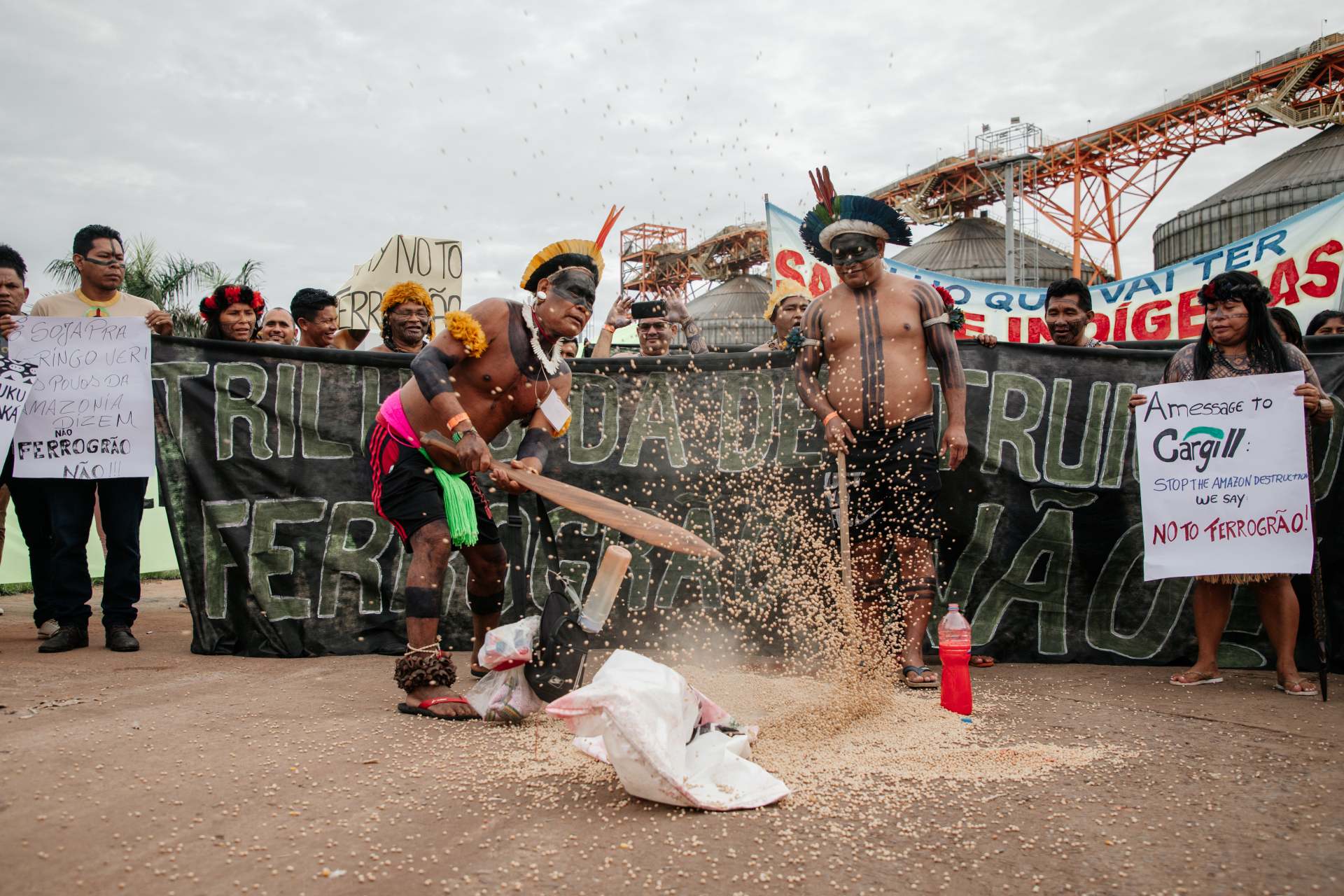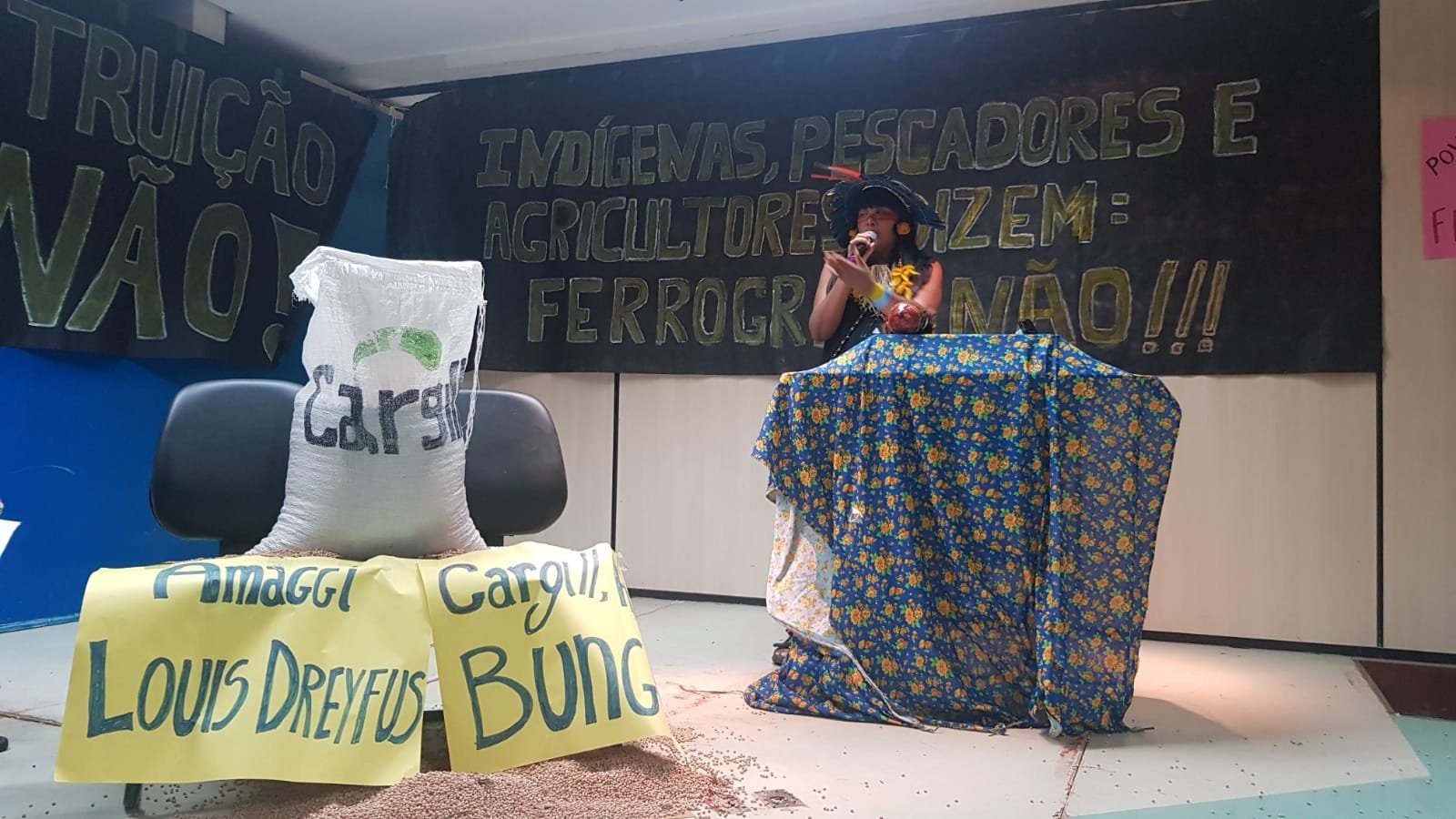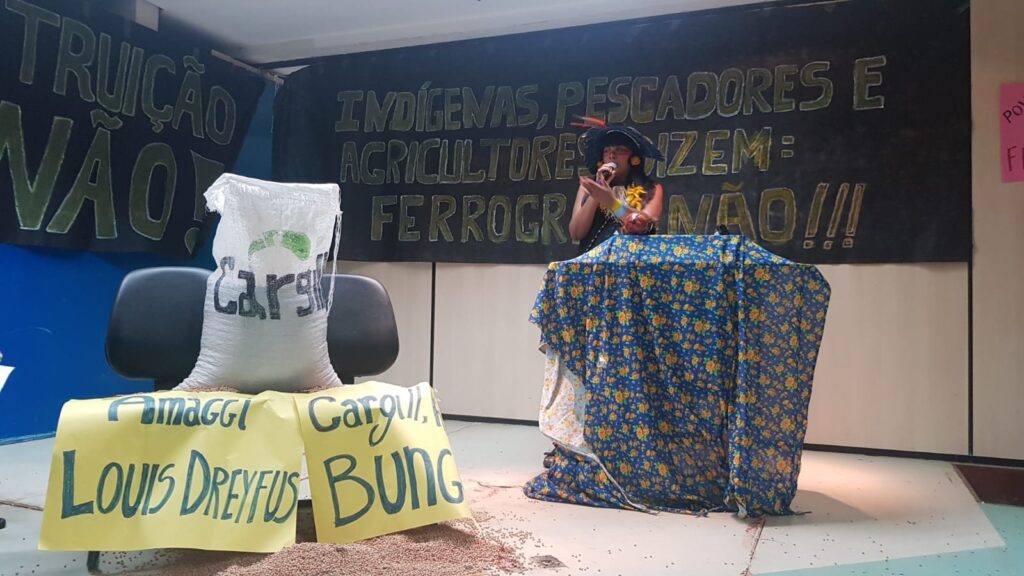CARGILL AND OTHER multinational grain exporters were “convicted” in a symbolic trial held in Santarém (PA) by indigenous peoples, river dwellers, and family farmers on Monday (4). In the “people’s court,” the multinationals were “judged” for the impacts their businesses have on the peoples of the Amazon. One of them is the construction of Ferrogrão, a railway conceived by agribusiness and endorsed by the federal government to facilitate the transportation of grains from Northern Mato Grosso and Southern Pará.
“This People’s Tribunal determines the immediate and definitive cancellation of the Ferrogrão project due to the damages incurred against the nature and inhabitants of the Tapajós and Xingu regions,” concludes the symbolic sentence released by the indigenous people after the trial. Cargill sent a note to the newsroom stating that it “does not participate in the consortium formed for the construction of Ferrogrão.”
This is the latest accusation against Cargill for generating socio-environmental impacts on the peoples of the Amazon. Repórter Brasil compiled in a groundbreaking monitor, released on Tuesday (5), investigations showing other human rights and environmental violations associated with the company. See the full report here.
From Pomarola tomato sauce to Liza cooking oil, Cargill owns numerous food brands and has branches in the biofuels, cocoa, animal nutrition, and grain sectors. The company leads international sales of corn and soybeans and exceeded R$ 100 billion in revenue in 2021.
Environmental Concerns
The tribunal in Santarém comes after a demonstration by the peoples affected by Ferrogrão in front of Cargill’s port, which has long been a target of complaints from the local population.
“This place where Cargill’s port is located in Santarém represents indigenous genocide. Here is the cemetery of the Tapajó people, where the ancient village of our relatives was,” says Raquel Tupinambá. “The waterway connecting Itaituba to Santarém cuts the Tupinambá territory in half. Every day we see boats descending the river loaded with grains, polluting our waters.”
Indigenous communities and family farmers claim to be affected by agricultural expansion in the Amazon, a process that could intensify with Ferrogrão. The terminal moves 5 million tons of grains per year, with the expectation of reaching 15 million tons shipped if the railway becomes a reality.
“They are destroying our rivers, forests, and animals around us, on our land. We are surrounded by grains and pesticides. The poison [from soy] falls into the rivers where our children drink water and bathe. I am against illegal mining, predatory fishing, illegal logging, and against Ferrogrão, which brings no benefit. The only benefit it brings is the death of the environment,” says Mydjere Kayapó, from the Mekragnotire Indigenous Land.

“This is not food. This is poison. This destroys our lives. But we will defend our territory. Out with Cargill, the path of destruction, Ferrogrão, no,” said Alessandra Korap Munduruku, while holding soybeans.
Cargill has been implicated in other violations
In October 2023, Repórter Brasil showed that the infrastructure works of the multinational have a significant impact on the organization of society in its surroundings. This is the case with the grain loading and unloading port maintained by the company in the municipality of Itaituba (PA), the same one that will benefit from Ferrogrão. The port’s structure has a loading capacity of 24,000 tons per day, equivalent to eight barges.
With the port, from a small village, the region was transformed into a commercial, industrial, and port area, with intense truck traffic supplying the grain terminal. According to reports heard by the report, one of the main impacts is the increase in sexual violence and prostitution in the community.
At the time, Cargill stated that it “regrets knowing that there is this attempt to connect the company’s presence in Miritituba with such serious issues as abuse and exploitation of children and adolescents or violation of the rights of traditional communities. The full statement from the company can be read here.
Cargill has also been convicted in episodes involving slave labor and labor violations among its suppliers. In September 2023, the 39th Labor Court of Salvador (BA) convicted the company for practices of slave and child labor in cocoa plantations of its suppliers in Brazil. The court ordered Cargill to pay compensation of R$ 600,000 for collective moral damages, to be applied to child protection projects. An appeal is still possible.
In a statement sent to Repórter Brasil at the time of the publication of the report on slave labor in cocoa, the company stated that it “does not tolerate human trafficking, forced or child labor in its operations or supply chain.” The multinational also argued that it takes “immediate measures” to suspend suppliers caught in violations. Read the full statement sent by Cargill here.
Another report from April 2023 revealed that the company bought soybeans from a family whose Santa Ana farms in Cláudia (MT) have an area embargoed for illegal burning and deforestation. The negotiations took place between 2019 and 2022. When questioned at the time, Cargill stated that “these negotiations took place during the period when the producer in question was not part of any restrictive list and, after analysis, it was found that it met all the criteria for trading” with the company. The full statement can be read here.
“The company does not invest the appropriate resources in the teams that need to monitor the farms or in the depth of the investigations necessary to keep deforestation in the Amazon and Cerrado out of its supply chain,” comments João Gonçalves, Senior Director in Brazil for the NGO Mighty Earth, which takes actions to pressure the Cargill-MacMillan family, the controlling family of Cargill, to fulfill its socio-environmental commitments.
In Brazil, Cargill is a signatory to sectoral agreements focusing on the environment and human rights. In addition to the Soy Moratorium, which prohibits the purchase of grains from deforested areas in the Amazon, and the United Nations Global Compact for Sustainable Development, the company made headlines at the end of last year by announcing that it advanced its commitment to end deforestation in its production chain from 2030 to 2025.



